Merriam-Webster defines clutter to fill or cover with scattered or disordered things that impede movement or reduce effectiveness. The key (affiliate) to this definition is that clutter impedes movement or reduces effectiveness. Effectiveness that will impact your simple life or home. Many things may stop us from removing these obstacles and having an organized home. Today, I will discuss ways to motivate yourself to clear the clutter. Then, I will share statements to remember during the decluttering process. There is no negative self-talk here. This is a safe (affiliate) place.
Jump to:
- Stop Worrying About The Process
- Break the myth of why you are keeping things
- Put Your Emotions in Check
- Statements to Keep in Mind During the Decluttering
- Let go of the idea that someday I will use it.
- Homes do not need to be museums.
- Remove items that are considered trash.
- Discarding memorabilia will not take the memory away.
- Cut your losses on expensive items.
- If you lost the item, would you buy it again?
- Only keep a passionate hobby or collection of items.
- The price you paid in the past doesn't mean that is the value now.
- Keep Items that bring happy memories.
- Get rid of things that are not useful.
The first step is to review a few things before we discuss ways to motivate you to clear the clutter.
Stop Worrying About The Process
Before you start your decluttering project, you may be worried about the process, where to get rid of things, what to get rid of, and how long it will take. Worry can be a large block to moving forward.
In my post, I talk about questions to ask yourself to help get out of being worried before decluttering: QUESTIONS TO ASK YOURSELF TO STOP WORRYING ABOUT DECLUTTERING.
You may stop because you are anxious about an object or area you must visit because it isn't very pleasant to you. That's understandable. Get more tips by seeing my post Easy Ways to Transform Bad Memories into Good Ones.
We tend to feel that the process of decluttering will take a long time. However, taking small steps and working through small tasks will help make your achievable goals possible. You can visit my post about Decluttering Tasks by Season to assist you.
Break the myth of why you are keeping things
Another feeling that can come up is that you don't want to get rid of something someone gave you. This one can be tricky. An object can be given with strings attached. If the person likes to see the items they gave you on display, but you don't care for them, you may encounter significant problems. I talk about some solutions in my post: GIFT MYTHS THAT KEEP YOU STUCK IN CLUTTER.
Put Your Emotions in Check
This is a big one for so many people. Emotions can stop us from doing a lot in our lives, and decluttering is no different. It can be very difficult for people who are decluttering to downsize. I talk about great ways to downsize without guilt here.
The above are some of people's most popular challenges during decluttering. I'm sorry to say there are so many more obstacles that could be an issue.
Statements to Keep in Mind During the Decluttering
Let's review and remember these statements when embarking on the decluttering journey. They are great ways to motivate you to clear the clutter.
To help you get motivated to declutter, there are things you need to keep in mind that may stop you in your tracks. I modified statements based on random experiences and lessons I learned from various books and podcasts over many years. So, to make them easier to remember, I shortened them to be clearer and more direct without much jargon.
Let go of the idea that someday I will use it.
We all fall into this trap. We bought something and thought it was a great price, so I better get it because we will be moving into a larger house sometime in 1, 2, 3, or 5 years. Maybe you will, but is there a plan in place? Are you saving for a home? Do you have the space for this item to hang around for that long? Items left around 'just because' may be best served in a new home so they can be used now. I talk more about this in my post How to Combat "What if" Excuses that stop you from decluttering.
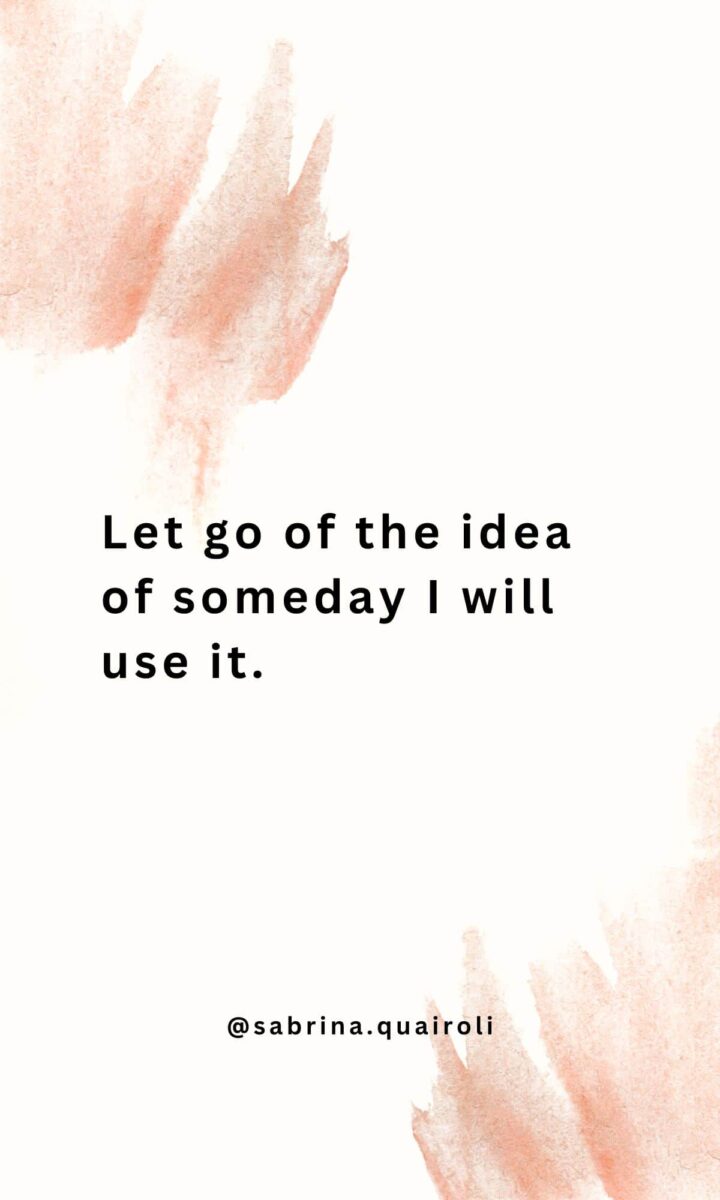
Homes do not need to be museums.
While I am the first person to enjoy a treasured heirloom, some items cause more work just sitting in one place. I've had some unique items in my house handed down from my parents, and while they were beautiful and lovely, they just didn't fit my smaller home.
Here are some questions to determine if you are considering removing the items.
- Do you have to clean the item often? Do you forget to do so?
- Does it need dusting often?
- Does it need repair, and have you repaired it?
- Does the item have a purpose?
- Does it bring you happiness?
- Is it the right size and aesthetic for your tidy home?
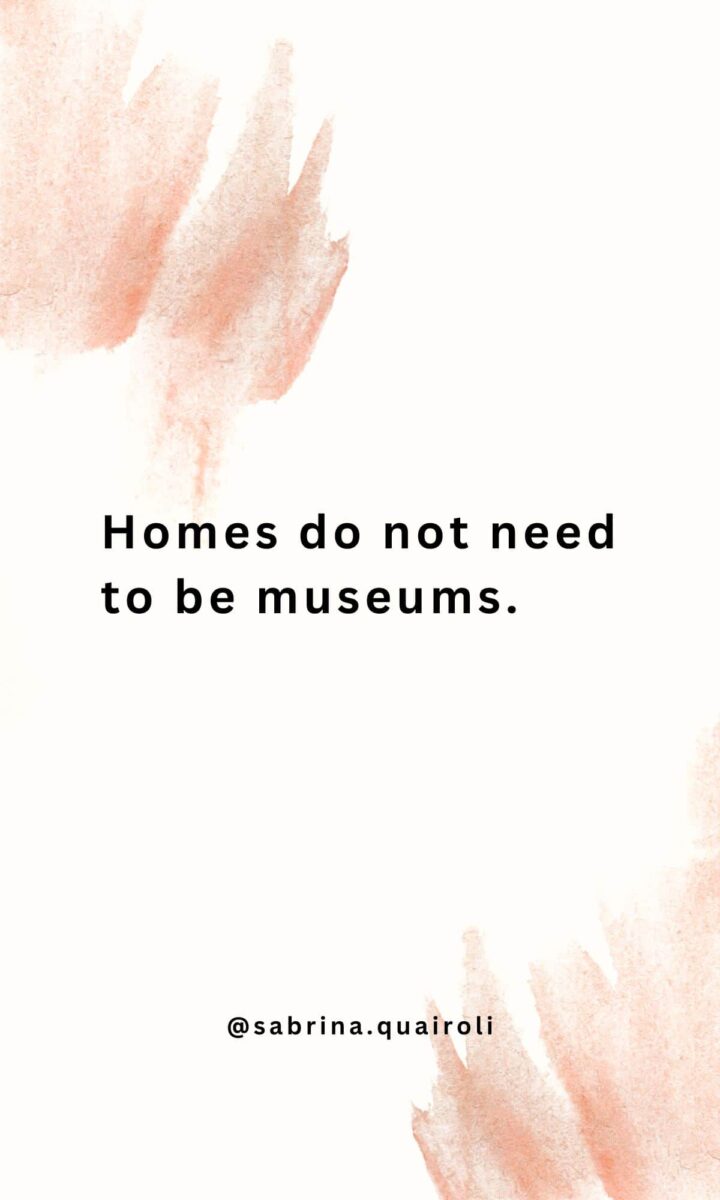
Remove items that are considered trash.
I dealt with this a lot as a kid. My parents were fruit and seed eaters, and there was always a peach pit or pumpkin seeds in the living room after a night of watching TV. The next day, you would find them on a paper towel on the end tables or pumpkin seed shells on the carpet. While I love my parents, I knew there was a better way to deal with these trash items.
An option is to add a trash can (affiliate) to each room to encourage trash to be placed in the appropriate spot. I like ones with lids to help contain the smell. When all the items are in a trash can (affiliate), you can easily empty them in a short amount of time.
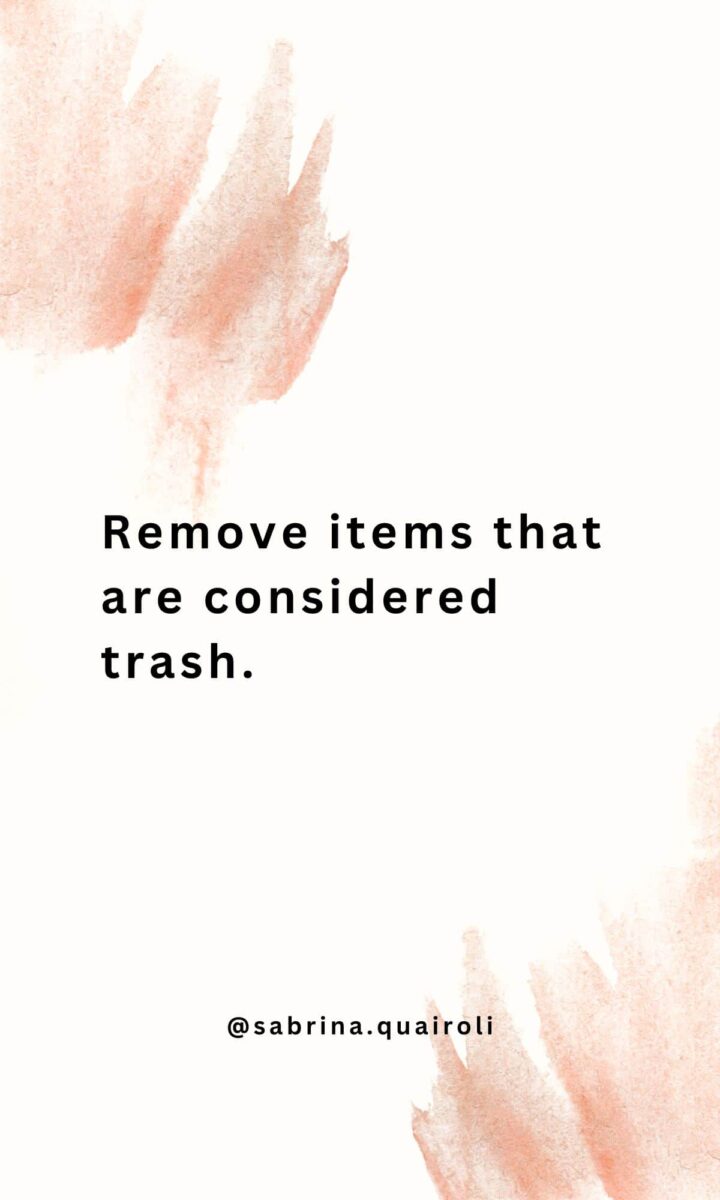
Discarding memorabilia will not take the memory away.
I'm dealing with this one right now; I decided to go through excess photos (already scanned and printed ones) that I had in an album. Most of them are digital. Some of them were from my parent's homes, and when they passed, they were randomly found through their things. So, my goal this year is to go wholeheartedly into digital with my new Epson scanner (affiliate). My son and daughter were devastated. "Why are you getting rid of these photos?" "I want to see them before you get rid of them." Even though I repeatedly told them these were just extras, and they have copies in their many scrapbooks, and we have digital files organized by year and event.
If you feel like getting rid of memorabilia, consider taking a digital photo or recording yourself holding the item, explaining what it was and its story (affiliate). Then, share this video or image with family members. You will be more likely and willing to get rid of an object when you have shared its importance in a story (affiliate) with people you love. They may even want the item. It will be a win-win.
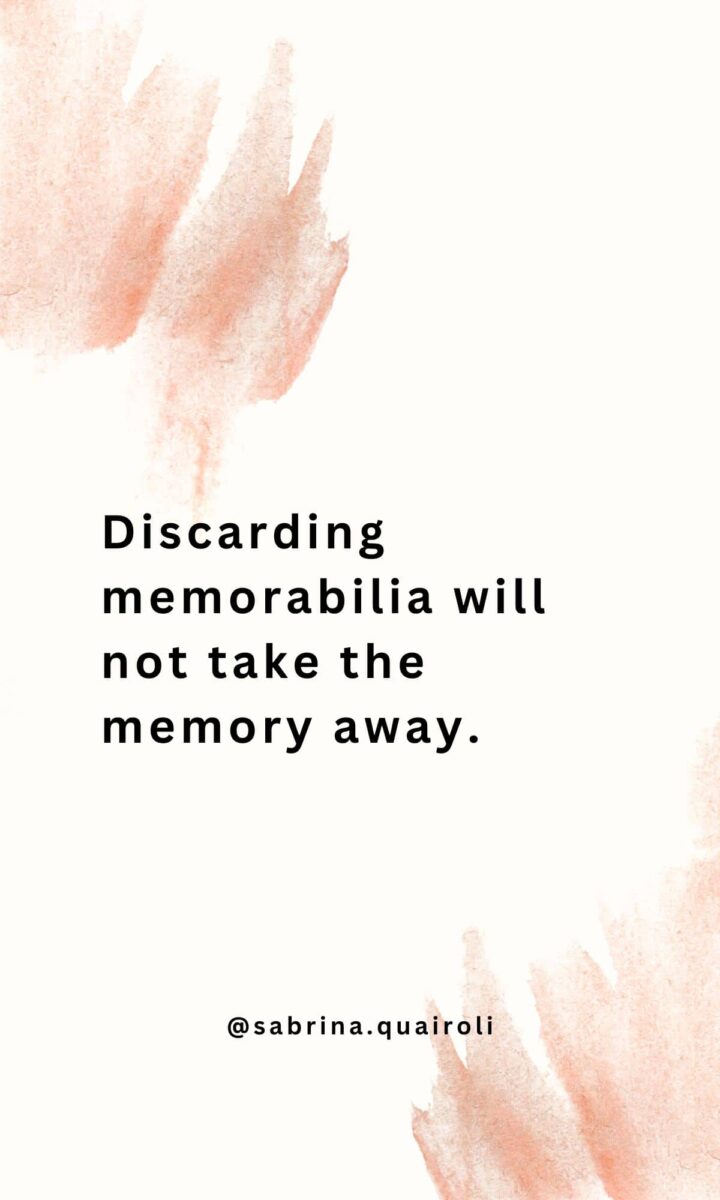
Cut your losses on expensive items.
We sometimes make spur-of-the-moment purchases without thinking them through. Other times, we will buy something costly at the time and feel, well, I will be able to sell it later, not realizing that if you can sell it, it will most likely be at a loss. No judgment here; I have had plenty of those items that were just given away or sold at a deep discount because I kept it for too long.
If you find yourself in this situation, remember that mistakes are what we make as humans. Doing some research to determine the price of the object will help you see the light of what it is actually worth. You are most likely to find your items on eBay, Poshmark, or The RealReal.
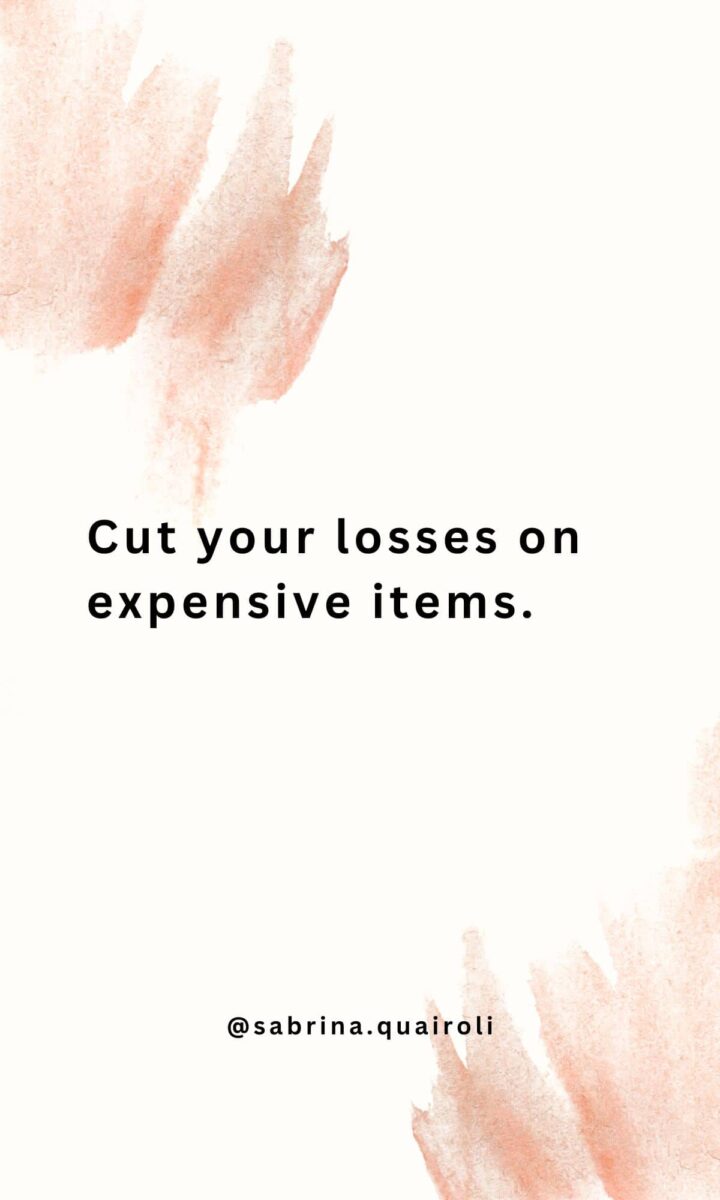
If you lost the item, would you buy it again?
This 'Motivate Yourself to Clear the Clutter' question is helpful to ask when you are torn between getting rid of an item and keeping it. Many times, we remember how much something was more than where or when we bought it.
This question gives you a reality check to see if where you are right now in your life is the same place as it was when you bought the item. I bet you aren't in the same place.
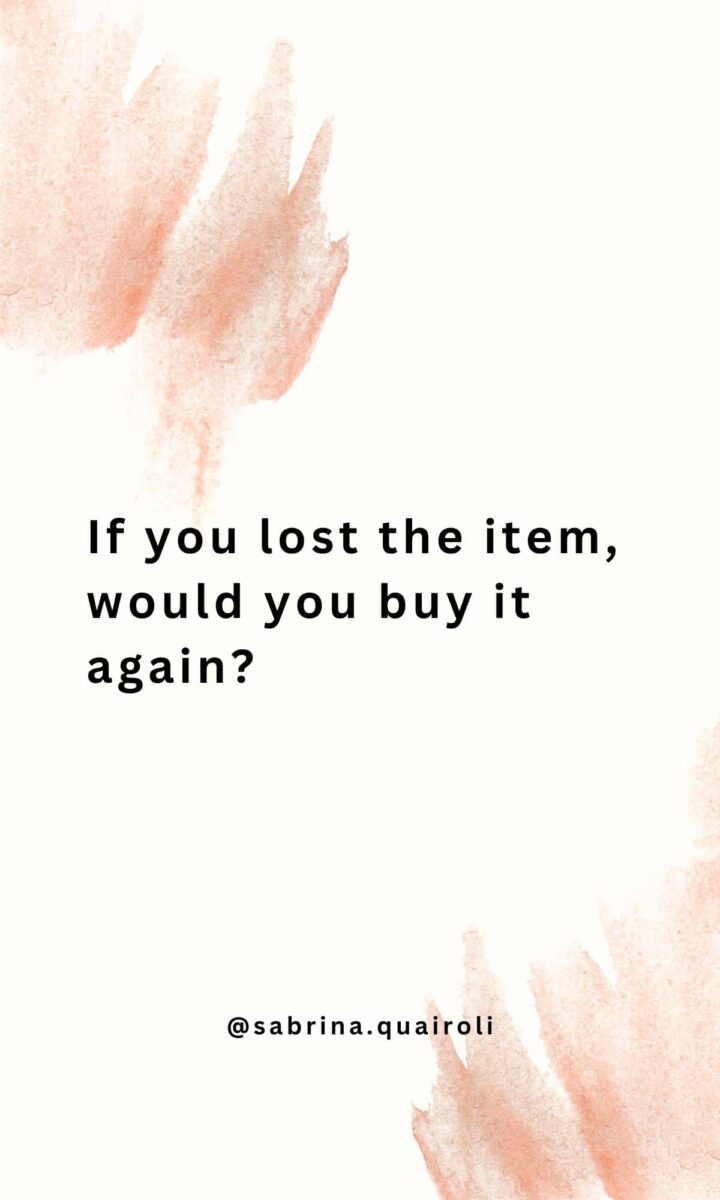
Only keep a passionate hobby or collection of items.
The next statement is for people who have hobbies. These hobbies could be things you do at home or outside the home. From my experience, people with hobbies usually have more than one hobby they enjoy doing. I have three, and my daughter has seven. It depends on the person. However, depending on your situation, you may need to get rid of a hobby.
To do this, ask yourself:
- What is my favorite hobby that I do all the time?
- Which hobby makes me feel relaxed and rejuvenated?
- Is that hobby low-cost? If not, am I willing to spend the larger pricetag on that hobby?
- Does that hobby bring me joy or frustration?
- Is this hobby a core value or belief of mine?
Answering these questions will help determine which hobby you should keep.
And, if you love collections, reducing the collection to make room for space in your home may be an option.
I used to collect lots of figurines and knick-knacks; after they covered several surfaces, I realized that keeping them and the surface clean was becoming a hassle. So, now, I have decided to add these items to a tall curio cabinet (affiliate) where I can still enjoy them but won't have to clean them more than once a year.
If you love collectibles and want to keep only a few out, you can try placing them protected in a box and only keeping a few out at a time.
You can also give some of them to your children or relatives so they can enjoy the collection. However, keep in mind that they should only be given if they absolutely want it.
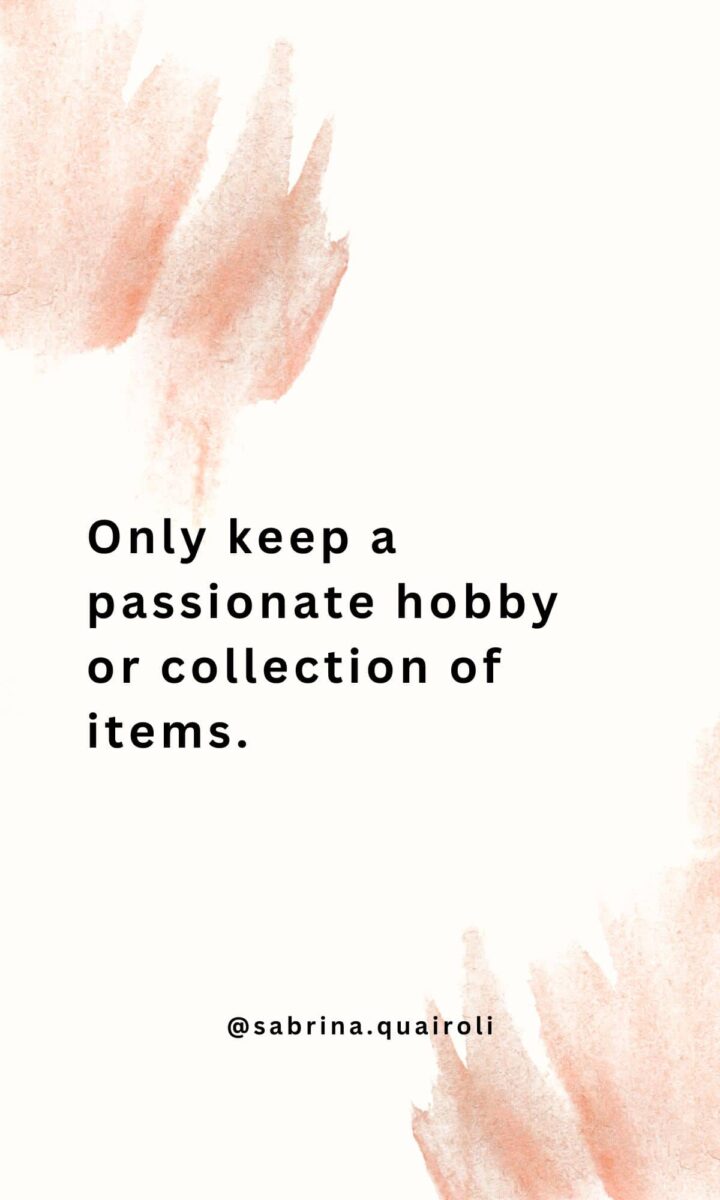
The price you paid in the past doesn't mean that is the value now.
Price is a tricky thing. I had many people get stuck on getting rid of things because of the price of an item. Keep in mind that the amount you paid was determined by the demand for that item. If the item was in demand and it was low in inventory, you may have paid more for it.
Remember, the price of selling the item is determined right now- not from the past or the future. If you were willing to pay the price in the past but are not willing to pay the price now, that is OK.
Be kind to yourself. At different stages of our lives, we choose to pay for things at different price points. A college student may want to buy things at a thrift store, whereas a person with a full-time job may want to spend more on their items. It's all about the perception of where we are at that moment.
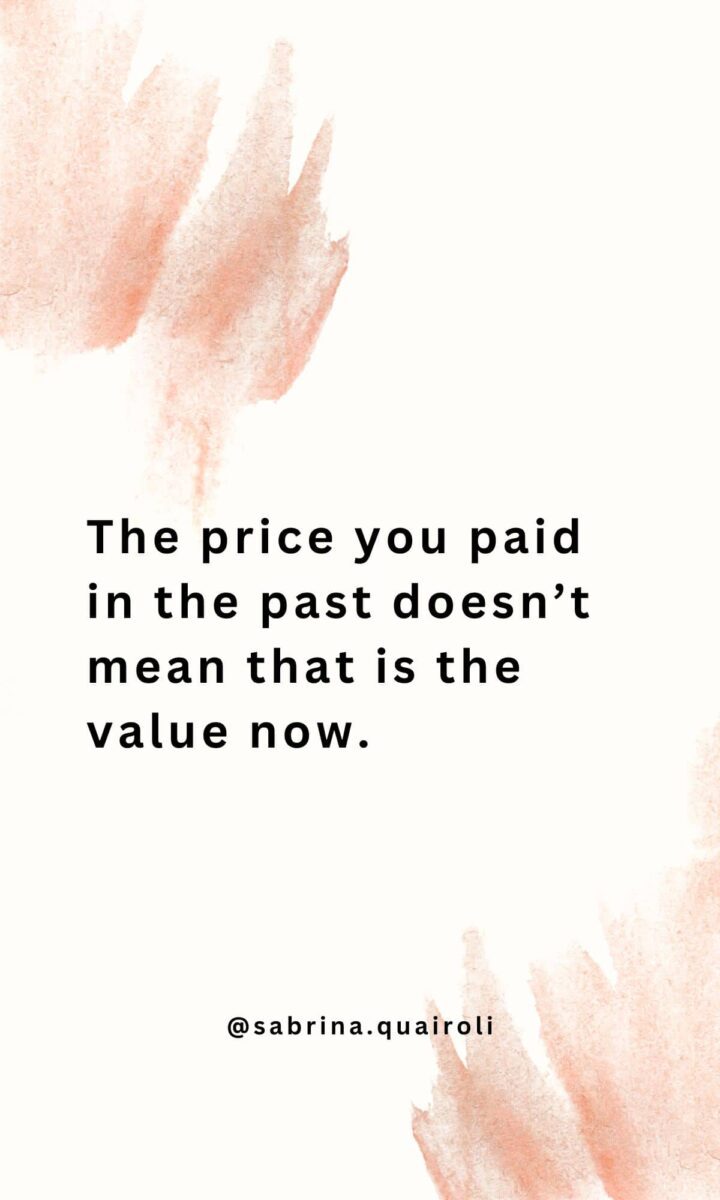
Keep Items that bring happy memories.
Having items that make you happy are important in your home. During hard times, you may find that these happy memory items bring you some sense of joy. On the contrary, your joy comes from within, not from those items.
Keep in mind that the hard times come and go. And, that too shall pass.
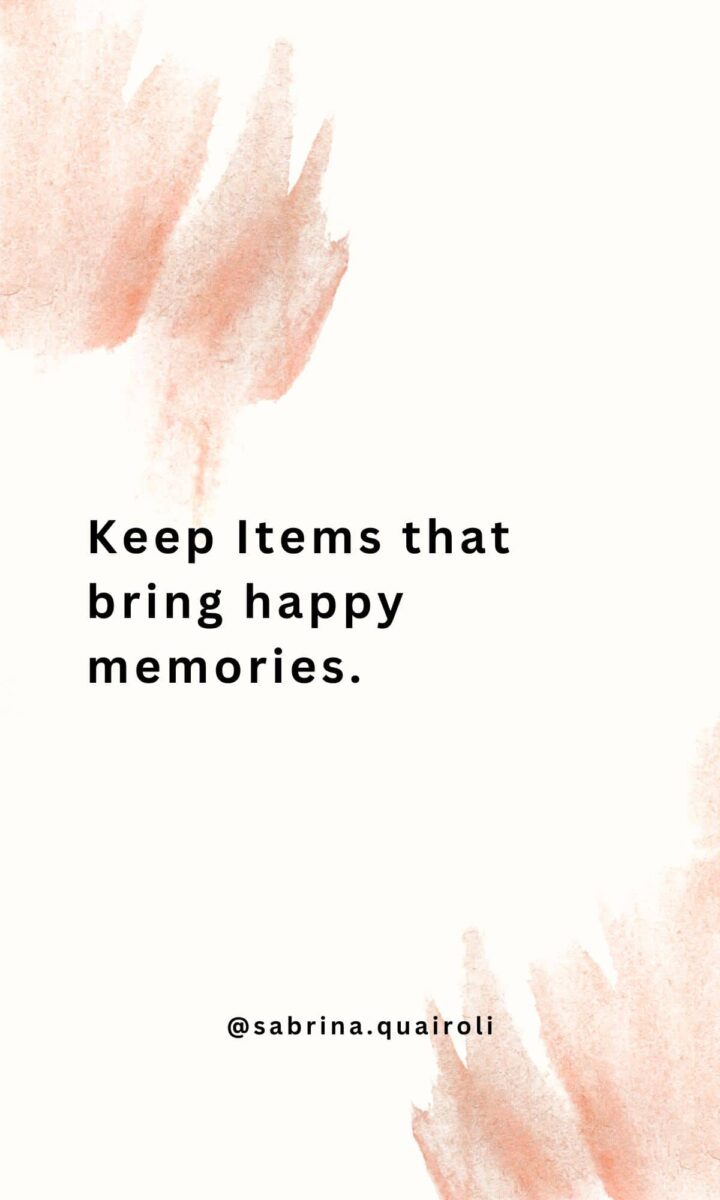
Get rid of things that are not useful.
And lastly, if you are looking to be more mindful of the things you have in your entire home, you may want to reduce the things that are not useful any longer. That mixer (affiliate) you never use - that toaster that doesn't work but is still around. All these items can be recycled or donated/sold to make room for a cleaner, more harmonious home.
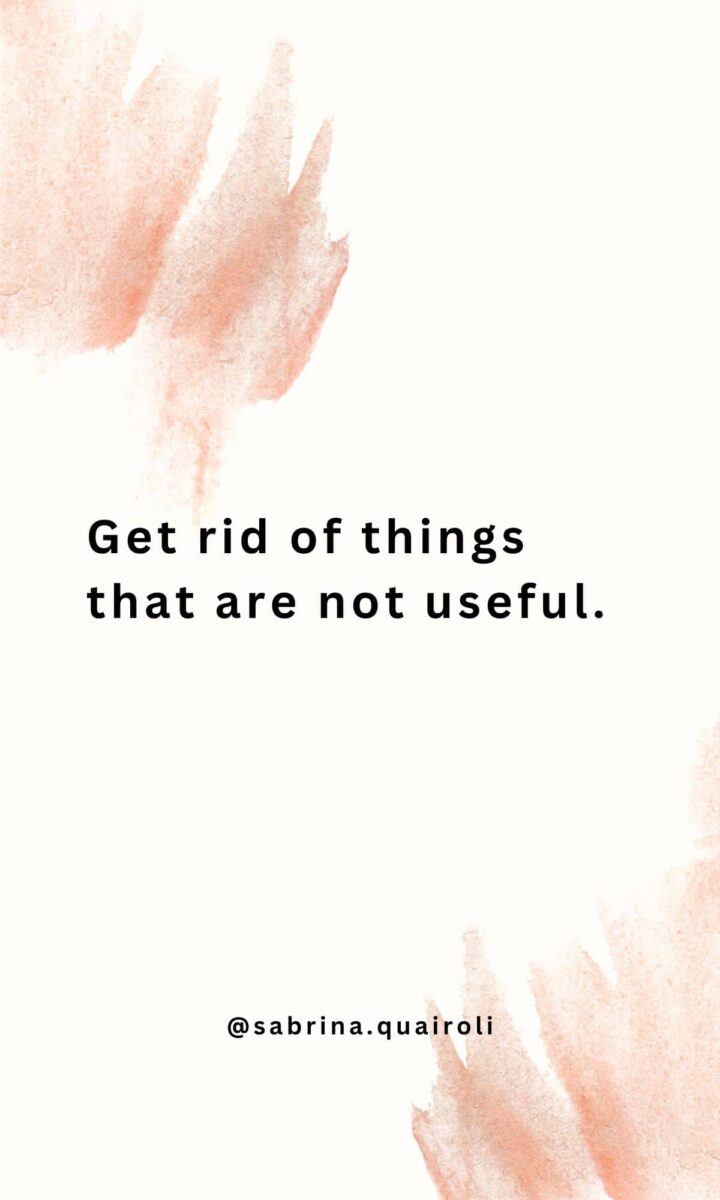
I hope these 'Motivate Yourself to Clear the Clutter' statements and tips help you stay on track and keep the ball rolling when clearing out your messy house. Working past these challenges will give you a sense of accomplishment and help you with the ongoing process of decluttering.
If none of these tips and statements help, you may want to try a topic-specific organizing challenge on my blog. I have tons of them. Please leave a comment or question below. I would love to hear from you.
Feel free to check out my other declutter advice posts to motivate you with your entire home.
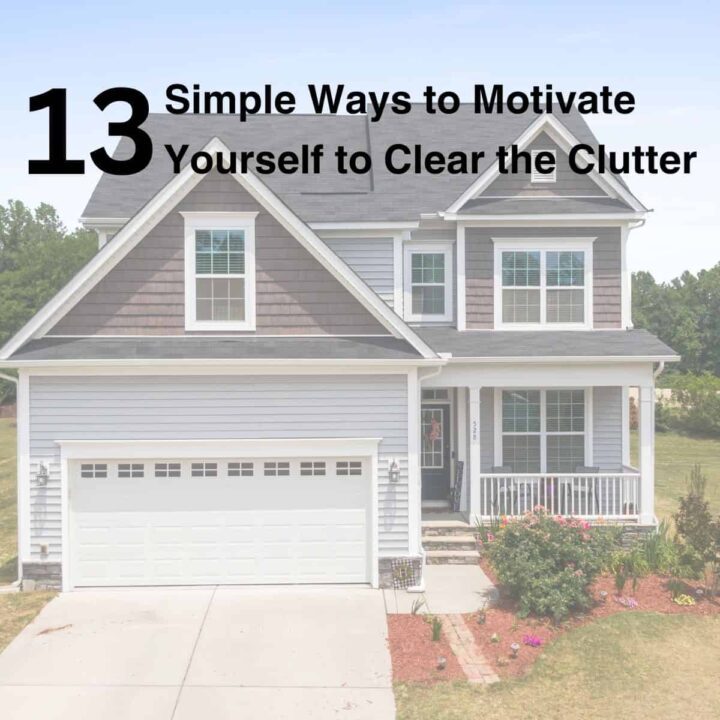
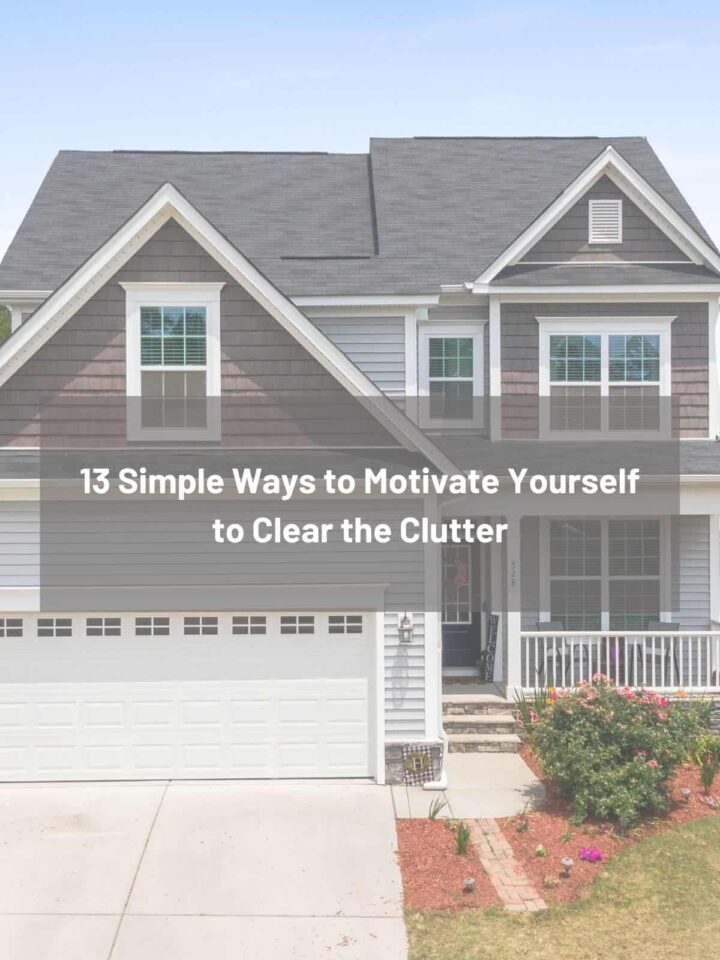

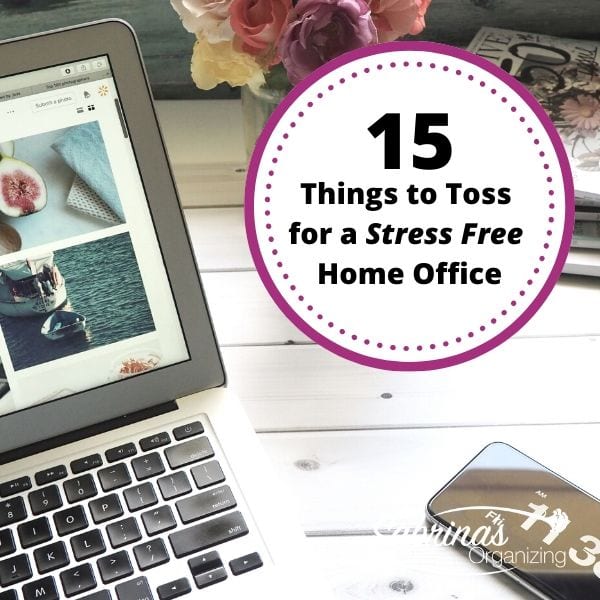
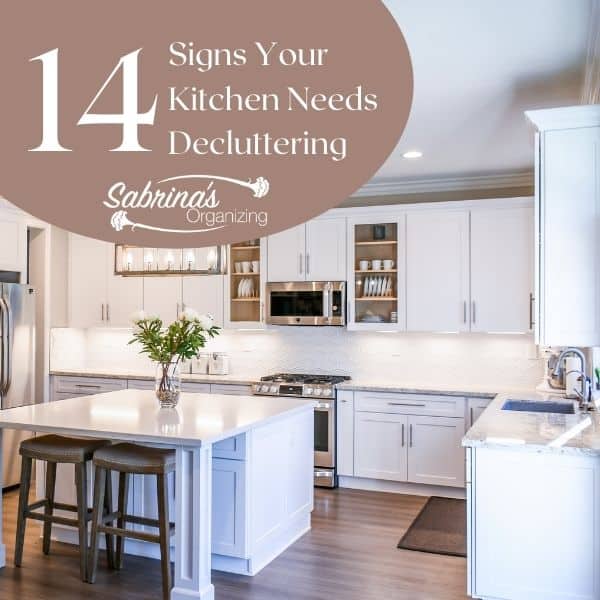
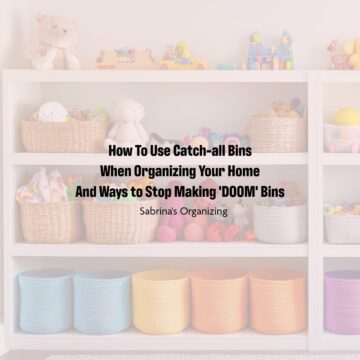
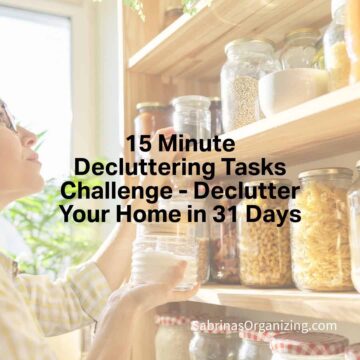
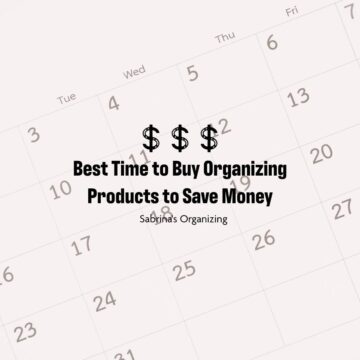
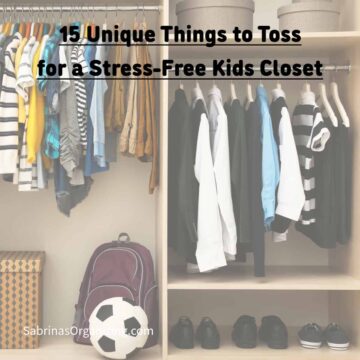
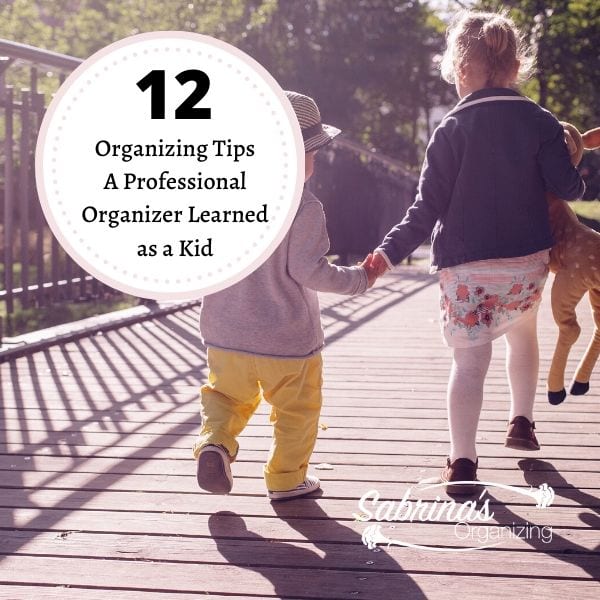
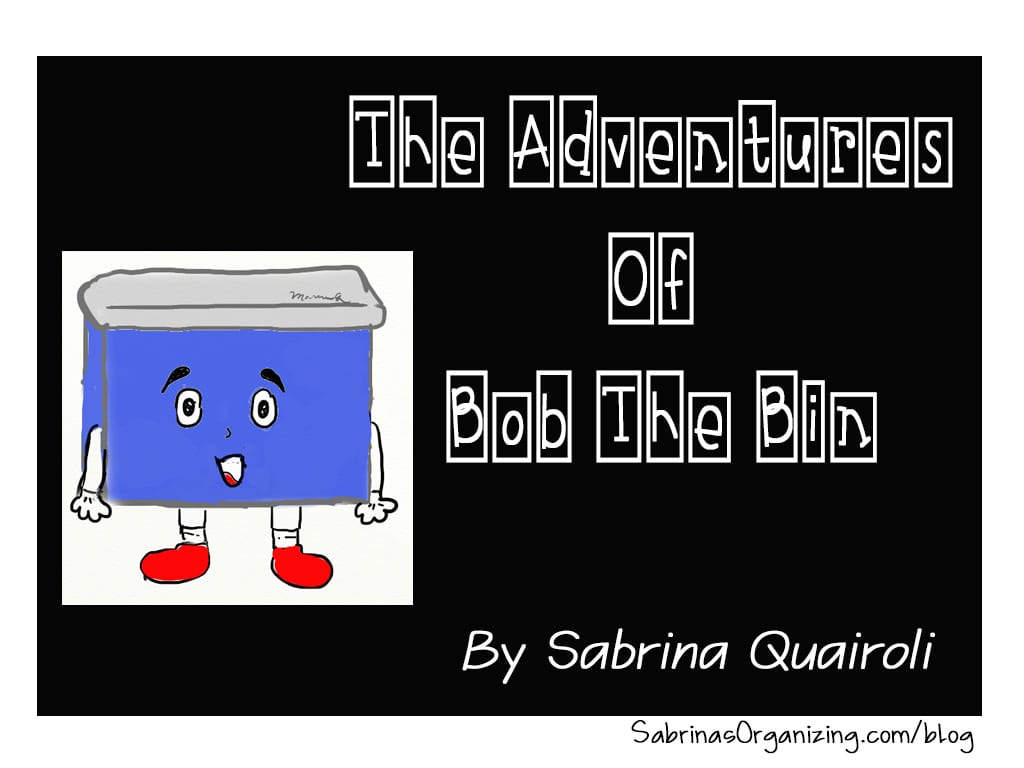
Diane Quintana says
These are all great tips, Sabrina. The one about not letting your home become a museum is especially meaningful. So many things are kept just because... It's important to let go of things we are not using and that don't support the way we want to live our lives.
Julie Bestry says
You hit all of the key points that key people blocked from moving forward in the decluttering and organizing process. I refer to it as "sitting on our 'buts'" (as in, "But it was expensive!" or "But it was a gift!"). All of these are mindsets, not realities, and you've pointed out how to refresh your approach.
The most valuable statement for me relates to cost not equaling value, but I know many of my clients need to understand that letting go of the idea that they'll use it in the random someday (rather than scheduling and planning for an actual date) is transformative. Great points!
Kim says
Hi Sabrina,
I really love all the questions you pose. I think they really help someone to go deeper and to really look to the core of the clutter issue which can help with decision making and to really make some progress in their home. You have a great collection of quotes here too.
Seana Turner says
I'm loving all these motivational messages. Sometimes a message like one of these can help us stay hopeful, even when we feel like we are failing over and over. Pinned to my "Inspiration" board so I won't forget them. 🙂
Linda Samuels says
There can be so many obstacles to letting go. I love all of the ideas you shared for ways to address these challenges. And it's great to have various ideas to pull from because every situation or clutter-creating object 'hits' us differently. Sometimes, it's easy to let go, and at other times, when emotions or cost are factors, letting go can be more challenging.
One of the challenges my clients experience most frequently is the 'might need it someday' idea. So, I especially appreciated your statement, "Let go of the idea that someday I will use it." Of course, none of us know what the future will bring. But for items that can easily be replaced, last used in a long time, or are unlikely to be used in the future, letting go is a good option. Why store those 'someday might need' items?